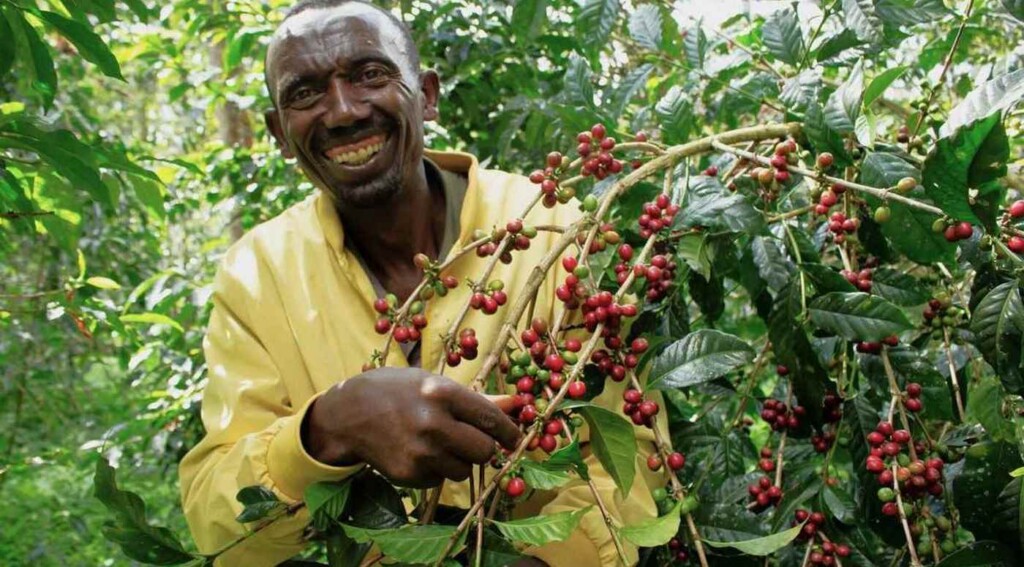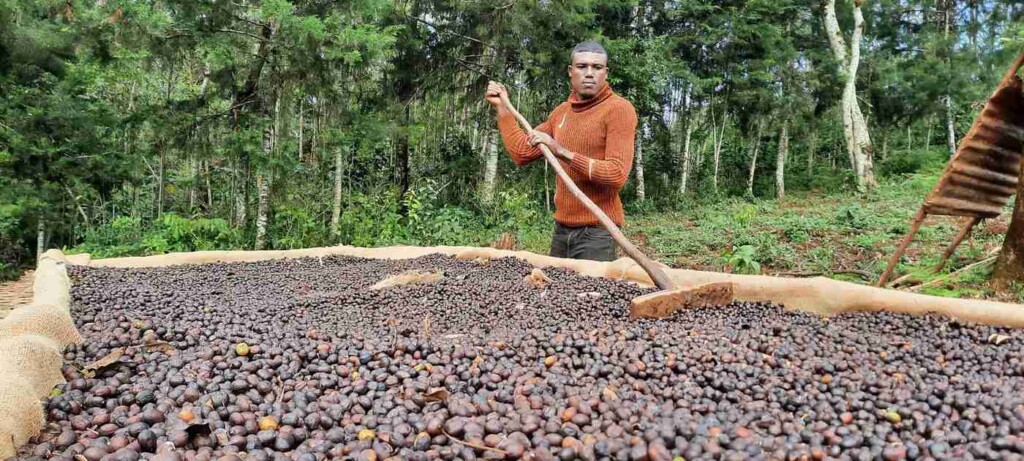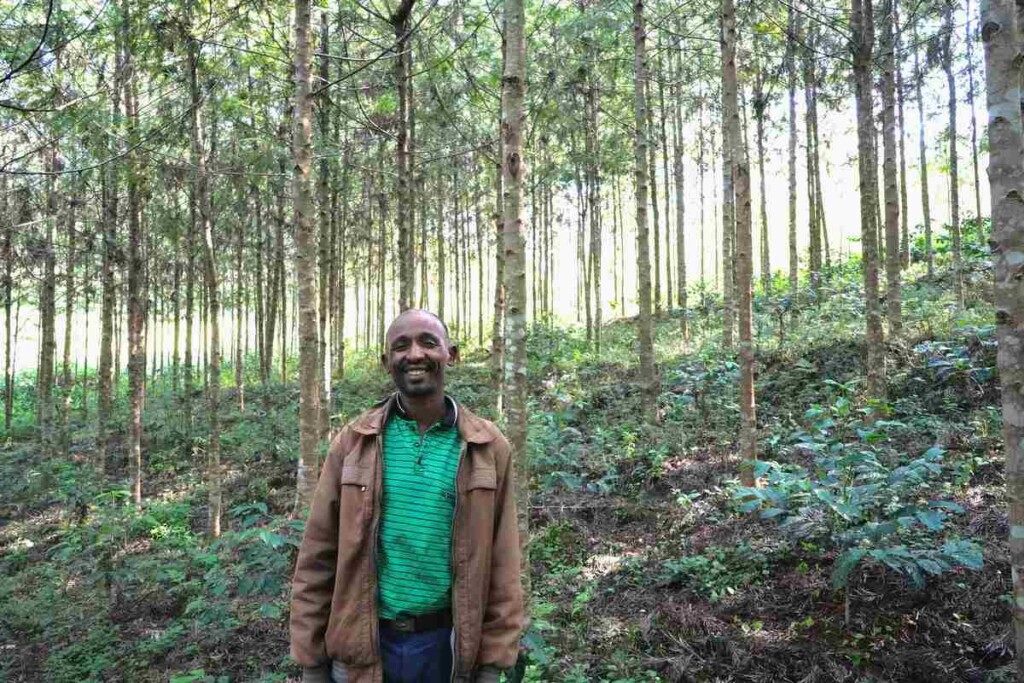 Girma Legesse smiles with his coffee – credit Farm Africa Coffee for Conservation, supplied
Girma Legesse smiles with his coffee – credit Farm Africa Coffee for Conservation, suppliedThe existence and consumption of coffee has many advantages in human society, but perhaps the lesser reported advantage is what it can offer the environment.
There is arguably no other monocrop so capable of thriving in an intact, natural ecosystem, and in Ethiopia, where coffee is a major export, the adoption of climate-compatible and conservation strategies among coffee growers recently proved a major success, with over 5,000 acres of land reforested, 45% increases in household income, and a 70% increase in exported coffee.
 – credit Farm Africa Coffee for Conservation, supplied
– credit Farm Africa Coffee for Conservation, suppliedCoffee is a major lifeblood of Ethiopia’s economy (we’re talking about a quarter of the whole), accounting for around half of the livelihood of 15 million people, 95% of whom are small landholding growers.
In the ecologically critical Ilu Ababor Zone of nation’s western region of Oromia, where Coffea arabica is native, Farm Africa led a project on sustainable agriculture among coffee growers inside 19 local forest management cooperatives totaling around 4,000 people between 2021 and 2024.
The results were better than a hot cup of coffee on a cold early morning, as the residents took to the skills, incentives, and even stakeholder meetings with great interest and dedication according to a report on the project entitled Coffee for Conservation.
Of the project aims regarding forest management and conservation, the objective was to instruct the landholders and growers in ways to get everything they needed from their forest homes without felling too many native trees.
For example, locals were shown how to cultivate fast-growing trees optimal for firewood in small plots, as well as methods on how to maximize the growth cycle of these fuel trees. Six tree nurseries were opened and staffed by around 60 people taught to sell seedlings for reforestation of native woodland in the area.
By the end of the project, over 300,000 seedlings had been planted over 5,000 acres of forest, and they enjoyed a five-year survival rate of 85%. Climate-smart practices such as cultivating bamboo for making the mats on which the coffee beans are dried, removed the need to truck in bamboo from other regions, while 66% of homes were able to be convinced to switch to energy-efficient wood stoves to reduce fuel consumption.
Most of the landholders growing coffee or managing the forest had plots for vegetable and fruit production to feed their families and those of their communities through trade. Percentages of these Ethiopians who adopted climate-smart farming techniques increased from 49% to 76%, while 10% more began growing fruit and vegetables. Income generated from the increased production amounted to around 280% more than what was made before the project, adjusted for inflation.
MORE STORIES LIKE THIS FROM AFRICA: African Forest Farming Initiative Making A Difference to Thousands with Tree-Planting and Microlending
Coffee production, marketing, and returns, have all improved. 73% more coffee from the Ilu Ababor region is now export-quality than in 2021, and 44% meets the standards for specialty grade, which is up by 20% from 2021.
Connections with national financing intuitions have allowed some of the co-ops to buy proper equipment for drying and storage, as well as support by city marketing agencies who could work directly on behalf of the Ilu Ababor growers to carve out a space in the national and international markets.
 – credit Farm Africa Coffee for Conservation, supplied
– credit Farm Africa Coffee for Conservation, supplied“Prior to the project, our limited knowledge meant we had to sell our coffee to local traders at lower prices,” said Abde Musa, a member of the Abdi Bori forest management cooperative. “Now we’ve taken control and are the ones negotiating and determining the coffee prices.”
ETHIOPIAN NEWS: Ethiopia May Have Just Shattered World Record By Planting 350 Million Tree Saplings in One Day
Co-op leaders received training in business management, quality control, and certification processes, which majorly improved their incomes. One of the 19 co-ops in particular grossed $58,500 on their coffee sales.
Project wide, incomes and access to financial services almost doubled, with the latter now reaching almost 100% of the community.
Lastly, deforestation plummeted in the area to just 0.08 acres a year.
ALSO CHECK OUT: Farmers Use Bees to Deter Elephants from Romping Over Crops–a Win-Win for All
There’s so much good news to read in the report on the project’s success beyond the headline data, like the Abdi Bori co-op’s incredible rise which saw coffee sales revenue ventuple from 2018 to 2023, or Solomon Mekonnen’s story of turning his land into a forest farm that produces export-grade coffee, firewood, and organic honey, or the tremendous involvement of women at all levels of the education and participation.
It’s a document that captures the very real phenomenon that African problems are best solved with African solutions.
SHARE This Laudable Work Out In The Green Hills Of Africa…
Source link

